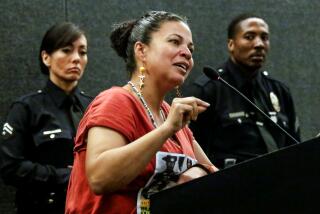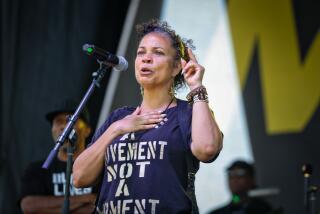Opening Day for Defense in King Case Is Mixed : Trial: Lawyers for four officers make progress with PCP testimony, but cross-examination of two witnesses proves a setback.
- Share via
In the opening day of defense testimony, lawyers for the police officers charged with violating Rodney G. King’s civil rights gained ground Tuesday with testimony about PCP intoxication but lost it during the withering cross-examination of two other witnesses.
Several defense lawyers appeared glum as they left the courtroom. One of them, Michael P. Stone, conceded that the opening day of the defense case had produced mixed results.
For the record:
12:00 a.m. March 19, 1993 For the Record
Los Angeles Times Friday March 19, 1993 Home Edition Metro Part B Page 3 Column 5 Metro Desk 2 inches; 38 words Type of Material: Correction
King case--The Times reported Wednesday that Los Angeles School District Police Officer Paul J. Beauregard testified during the Rodney G. King civil rights trial that he and one of the defendants joked with King about the beating. The joke was not about the beating itself.
“It was good in the morning, not so good in the afternoon,” he said, acknowledging that two defense witnesses, Paul J. Beauregard and Joseph F. Napolitano, had their credibility impugned by federal prosecutors.
“They’re all going to take hits” on cross-examination, Stone said. “These are good lawyers.”
Beauregard and Napolitano both were called by Ira Salzman, the lawyer for Sgt. Stacey C. Koon. Koon, the senior officer at the scene of the King arrest, is charged with allowing officers under his supervision to administer an unlawful beating, depriving King of his right to be safe while in custody.
Three other defendants--Laurence M. Powell, Timothy E. Wind and Theodore J. Briseno--are accused of kicking, stomping and beating King with batons, violating his constitutional right to be safe from the intentional use of unreasonable force. All four men face up to 10 years in prison and fines of $250,000 each if convicted.
Prosecutors completed their case against the four defendants Monday. On Tuesday, one of the first witnesses for the defendants, Officer Susan J. Clemmer, told jurors that King had laughed about the beating and had spit blood on her during the ambulance ride to the hospital.
Repeating testimony that she gave during last year’s state trial, she also said she had seen Powell seconds after the beating and that he appeared frightened by the confrontation. “I was scared,” she said Powell told her. “The guy threw me off his back. I thought I was going to shoot him.”
Clemmer was the first witness to suggest to federal jurors that Powell and the other officers were frightened by King that evening, and her testimony is an important part of their defense. She was followed, however, by Beauregard, a Los Angeles Unified School District police officer who participated in the pursuit of King.
He testified that King had failed to comply with police orders, even though the orders seemed clear and unambiguous. Under questioning from Salzman, Beauregard also said that he saw King shake off four or five police officers who tried to hold him down and handcuff him.
But Alan Tieger, a Justice Department lawyer and one of four attorneys helping to prosecute the case, elicited a number of concessions from Beauregard on cross-examination. Beauregard admitted, for instance, that he told a state grand jury that most of the baton blows he saw Powell deliver were one-handed, that King was standing through most of the incident and that King seemed largely unaffected by the beating. All of those statements are contradicted by the videotape of the incident.
In addition, Beauregard, who described himself as a friend of Powell, admitted that he and Powell joked with King about the beating while King lay on the ground handcuffed, his face bloody and swollen. And he said he overheard what he thought was Powell laughing as he called for an ambulance.
“It sounds like maybe a laugh, maybe a gasp for air,” Beauregard said after listening to a tape of the call.
Tieger then presented Beauregard a copy of testimony he gave to a federal grand jury, however, and Beauregard admitted that he previously had described the sound as a laugh.
Napolitano did not fare much better on the stand. Although he made some points for the defense--reiterating Beauregard’s contention, for instance, that no officers taunted King or yelled racial epithets at him during the beating--his credibility and competence came under attack.
For instance, Napolitano, said he concluded that King was under the influence of PCP in part because an electrical device known as a Taser had failed to subdue the motorist. But earlier witnesses had told jurors that Tasers only work about 80% of the time, and that they do not work at all on some people.
Assistant U.S. Atty. Steven D. Clymer asked Napolitano whether he had considered that the Taser might have failed to affect King. Napolitano insisted that the only reason he could think of for the Taser to fail would be if the suspect either was under the influence of PCP or suffering from a psychological disorder.
Napolitano and Beauregard set back the defense efforts just as they were getting under way, and overshadowed testimony early in the day that had laid the groundwork for an important defense argument: that the officers could reasonably have concluded that King was under the influence of PCP during the arrest.
Edgar W. Oglesby, a 31-year veteran of the Los Angeles Police Department and author of “Angel Dust: What Everyone Should Know About PCP,” gave jurors a detailed description of the symptoms associated with use of the drug.
Lawyers for the officers did not call a PCP expert during last year’s state trial, but Oglesby told jurors that the symptoms that officers say they observed in King--a blank stare, incoherent speech, failure to respond to commands and unusually stiff muscles--were consistent with ingestion of the powerful drug.
“Based on all those symptoms, those classic symptoms, you’d have to make that assumption,” Oglesby said.
Although King never tested positive for PCP, Oglesby also said that PCP sometimes fails to show up in urine and blood samples and those tests would have to be done repeatedly over a number of hours to be authoritative. In King’s case, there were no such repeat tests.
The opening day of Salzman’s case also highlighted another aspect of the defense strategy, which is to argue that decisions by Los Angeles political leaders deprived the defendants of the right to use the “upper-body control hold”--also known as the chokehold. That method, defense lawyers said, could have been used to bring King into custody without harming him.
Although U.S. District Judge John G. Davies warned defense lawyers that he will not permit the case to become a trial about police policy-making, he allowed them to ask narrowly tailored questions of two local political leaders, Councilman Hal Bernson and Police Commissioner Michael Yamaki.
Bernson said the City Council placed a moratorium on the use of the chokehold in 1982 even though there was evidence that barring it might result in more baton injuries to suspects.
His testimony, however, opened the door for prosecutor Barry F. Kowalski to slip in a question about the reason for abolishing the chokehold.
“Was the reason for putting a moratorium on the upper-body chokehold because so many black people were getting killed?” Kowalski asked.
“I think that was one reason,” Bernson said.
More to Read
Sign up for Essential California
The most important California stories and recommendations in your inbox every morning.
You may occasionally receive promotional content from the Los Angeles Times.














